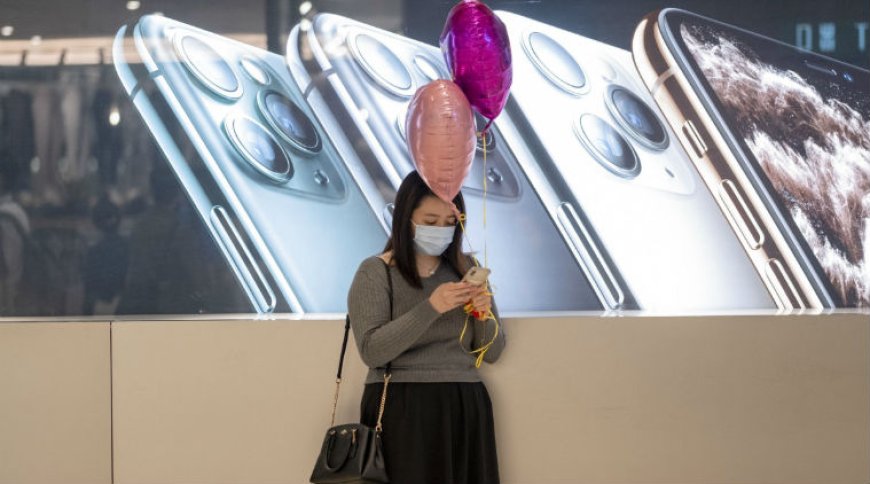Apple calls for 'out of control' AI news warning to be withdrawn
Apple is facing fresh calls to withdraw its controversial artificial intelligence (AI) feature that has generated inaccurate news alerts on its latest iPhones.

Apple is facing fresh calls to withdraw its controversial artificial intelligence (AI) feature that has generated inaccurate news alerts on its latest iPhones.

The product is meant to summarise breaking news notifications but has in some instances invented entirely false claims.
The BBC first complained to the tech giant about its journalism being misrepresented in December but Apple did not respond until Monday this week, when it said it was working to clarify that summaries were AI-generated.
Alan Rusbridger, the former editor of the Guardian, told the BBC Apple needed to go further and pull a product he said was "clearly not ready."
Mr Rusbridger, who also sits on Meta's Oversight Board that reviews appeals of the company's content moderation decisions, added the technology was "out of control" and posed a considerable misinformation risk.
"Trust in news is low enough already without giant American corporations coming in and using it as a kind of test product," he told the Today programme, on BBC Radio Four.
The National Union of Journalists (NUJ), one of the world's largest unions for journalists, said Apple "must act swiftly" and remove Apple Intelligence to avoid misinforming the public - echoing prior calls by journalism body Reporters Without Borders (RSF).
"At a time where access to accurate reporting has never been more important, the public must not be placed in a position of second-guessing the accuracy of news they receive," said Laura Davison, NUJ general secretary.
The RSF also said Apple's intervention was insufficient, and has repeated its demand that the product is taken off-line.
Series of errors
The BBC complained last month after an AI-generated summary of its headline falsely told some readers that Luigi Mangione, the man accused of killing UnitedHealthcare CEO Brian Thompson, had shot himself.
On Friday, Apple's AI inaccurately summarised BBC app notifications to claim that Luke Littler had won the PDC World Darts Championship hours before it began - and that the Spanish tennis star Rafael Nadal had come out as gay.
This marks the first time Apple has formally responded to the concerns voiced by the BBC about the errors, which appear as if they are coming from within the organisation's app.
"These AI summarisations by Apple do not reflect – and in some cases completely contradict – the original BBC content," the BBC said on Monday.
"It is critical that Apple urgently addresses these issues as the accuracy of our news is essential in maintaining trust."
What is AI and how does it work?
A simple guide to help you understand AI
The BBC is not the only news organisation affected.
In November, a ProPublica journalist highlighted erroneous Apple AI summaries of alerts from the New York Times app suggesting it had reported that Israel's Prime Minister Benjamin Netanyahu had been arrested.
A further, inaccurate summary of a New York Times story appears to have been published on January 6, relating to the fourth anniversary of the Capitol riots.
The New York Times has declined to comment.
RSF said the false, AI-generated headline about Mr Mangione in December showed "generative AI services are still too immature to produce reliable information for the public".
On Tuesday, it said Apple's plan to update the feature to clarify when notifications are summarised with AI to users "doesn't fix the problem at all".
"It just transfers the responsibility to users, who - in an already confusing information landscape - will be expected to check if information is true or not," said Vincent Berthier, head of RSF's technology and journalism desk.
Apple said its update would arrive "in the coming weeks".
It has previously said its notification summaries - which group together and rewrite previews of multiple recent app notifications into a single alert on users' lock screens - aim to allow users to "scan for key details".
"Apple Intelligence features are in beta and we are continuously making improvements with the help of user feedback," the company said in a statement on Monday, adding that receiving the summaries is optional.
"A software update in the coming weeks will further clarify when the text being displayed is summarization provided by Apple Intelligence. We encourage users to report a concern if they view an unexpected notification summary."
The feature, along with others released as part of its broader suite of AI tools was rolled out in the UK in December. It is only available on its iPhone 16 models, iPhone 15 Pro and Pro Max handsets running iOS 18.1 and above, as well as on some iPads and Macs.
Apple is not alone in having rolled out generative AI tools that can create text, images and more content when prompted by users - but with varying results.
Google's AI overviews feature, which provides a written summary of information from results at the top of its search engine in response to user queries, faced criticism last year for producing some erratic responses.
At the time a Google spokesperson said that these were "isolated examples" and that the feature was generally working well.






















































